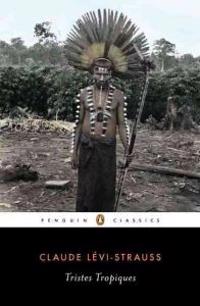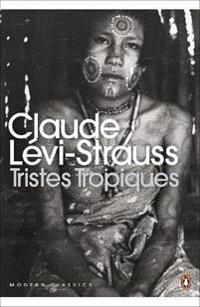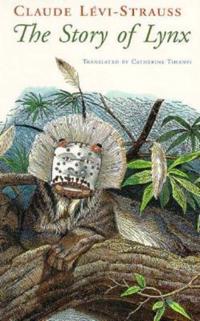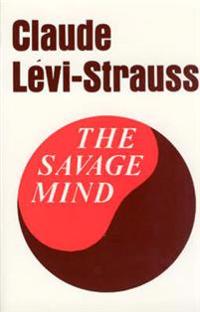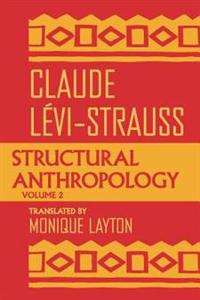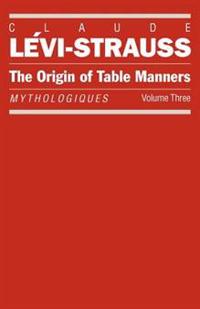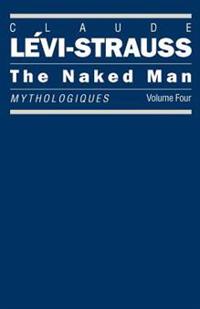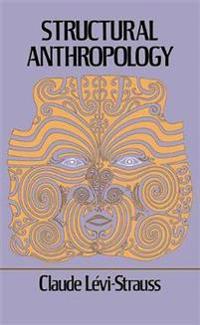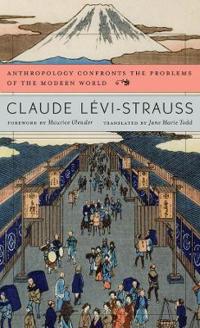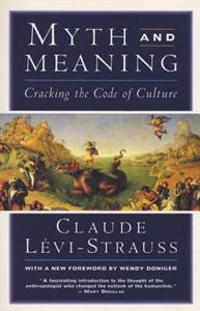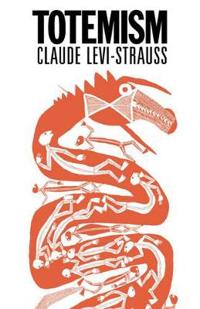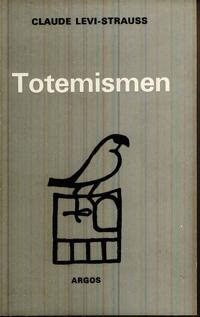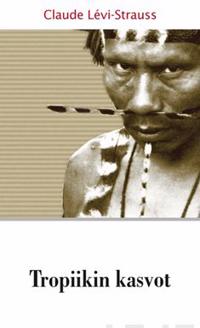Tristes Tropiques (Häftad)
avClaude Levi-Strauss, Claude Laevi-Strauss
ISBN: 9780143106258 - UTGIVEN: 201201A milestone in the study of culture from the father of structural anthropology. This watershed work records Claude Levi-Strauss's search for "a human society reduced to its most basic expression." From the Amazon basin through the dense upland jungles of Brazil, Levi-Strauss found the societies he w[...]
Tristes Tropiques (Häftad)
avClaude Levi-Strauss
ISBN: 9780141197548 - UTGIVEN: 201109"Tristes Tropiques" begins with the line 'I hate travelling and explorers', yet during his life Claude Levi-Strauss travelled from wartime France to the Amazon basin and the dense upland jungles of Brazil, where he found 'human society reduced to its most basic expression'. His account of the people[...]
Claude Levi-Strauss: The Father of Modern Anthropology (Häftad)
avPatrick Wilcken
ISBN: 9780143120629 - UTGIVEN: 2012-01When Claude Levi-Strauss passed away in 2009 at age 100, France celebrated the life and contributions of not only a preeminent anthropologist, but one of the defining intellectuals of the 20th century. Just as Freud had shaken up the antiquarian discipline of psychiatry, so had Levi-Strauss revoluti[...]
Claude Levi-Strauss (häftad)
ISBN: 9780226469683 - UTGIVEN: 1989-10In this lucide guide to the often abstruse works of Claude Levi-Strauss, Edmund Leach synthesizes the thought of one of the twentieth century's greatest anthropologists and provides a thoughtful introduction to the theory and practice of structuralism. Leach organizes his work not by chronology but [...]
The Story of Lynx (Inbunden)
avClaude Levi-Strauss
ISBN: 9780226474724 - UTGIVEN: 199510"In olden days, in a village peopled by animal creatures, lived Wild Cat (another name for Lynx). He was old and mangy, and he was constantly scratching himself with his cane. From time to time, a young girl who lived in the same cabin would grab the cane, also to scratch herself. In vain Wild Cat k[...]
The Jealous Potter (Inbunden)
avClaude Levi-Strauss
ISBN: 9780226474809 - UTGIVEN: 198805As Lévi-Strauss freely explores the mythologies of the Americas, with occasional incursions into European and Japanese folklore, tales of sloths and squirrels interweave with discussions of Freud, Saussure, "signification," and plays by Sophocles and Labiche. Lévi-Strauss critiques psychoanalytic [...]
The Savage Mind (Häftad)
avClaude Levi-Strauss
ISBN: 9780226474847 - UTGIVEN: 196809"Every word, like a sacred object, has its place. No "precis" is possible. This extraordinary book must be read."--Edmund Carpenter, "New York Times Book Review "
"No outline is possible; I can only say that reading this book is a most exciting intellectual exercise in which dialectic, wit, and [...]Structural Anthropology, Volume 2 (Univ of Chicago PR) (Häftad)
avClaude Levi-Strauss
ISBN: 9780226474915 - UTGIVEN: 198302The eighteen essays collected in this volume have been selected and ordered to give what Levi-Strauss terms "a bird's-eye view of the problems of modern ethnology." As representative examples, these essays introduce readers to the methods of structural anthropology while affording a glimpse into the[...]
The Origin of Table Manners: Mythologiques, Volume 3 (Häftad)
avClaude Levi-Strauss
ISBN: 9780226474939 - UTGIVEN: 1990-11The Naked Man: Mythologiques, Volume 4 (Häftad)
avClaude Levi-Strauss
ISBN: 9780226474960 - UTGIVEN: 199011""The Naked Man is the fourth and final volume [of "Mythologiques], written by the most influential and probably the most controversial anthropologist of our time. . . . Myths from North and South America are set side by side to show their transformations: in passing from person to person and place [...]
The Way of the Masks (Häftad)
avClaude Levi-Strauss
ISBN: 9780295966366 - UTGIVEN: 198206This text is a collection of illustrations of masks from the Northwest Coast.
The Raven Steals the Light (Häftad)
avBill Reid, William Reid, Claude Levi-Strauss
ISBN: 9780295975245 - UTGIVEN: 1996-01Myth and Meaning (Häftad)
avClaude Levi-Strauss
ISBN: 9780415253949 - UTGIVEN: 200105In addresses written for a wide general audience, one of the twentieth century's most prominent thinkers, Claude Levi-Strauss, here offers the insights of a lifetime on the crucial questions of human existence. Responding to questions as varied as 'Can there be meaning in chaos?', 'What can science [...]
Myth and Meaning (Häftad)
avClaude Levi-Strauss
ISBN: 9780415854696 - UTGIVEN: 2013-07The anthropologist Claude Levi-Strauss was one of the greatest intellectuals of the twentieth century. His work has had a profound impact not only within anthropology but also linguistics, sociology and philosophy. In this short book he examines the nature and role of myth in human history, distilli[...]
Structural Anthropology (Häftad)
avClaude Levi-Strauss
ISBN: 9780465095162 - UTGIVEN: 197405The structural method, first set forth in this epoch-making book, changed the very face of social anthropology. This reissue of a classic will reintroduce readers to Lvi-Strausss understanding of man and society in terms of individualskinship, social organization, religion, mythology, and art.[...]
Anthropology Confronts the Problems of the Modern World (Inbunden)
avClaude Levi-Strauss, Maurice (FRW) Olender, Jane Marie (TRN) Todd
ISBN: 9780674072909 - UTGIVEN: 2013-03Anthropology Confronts the Problems of the Modern World is the first English translation of a series of lectures Claude Levi-Strauss delivered in Tokyo in 1986. Written with an eye toward the future as his own distinguished career was drawing to a close, this volume presents a synthesis of the autho[...]
The Other Face of the Moon (Inbunden)
avClaude Levi-Strauss, Junzo (FRW) Kawada, Jane Marie (TRN) Todd
ISBN: 9780674072923 - UTGIVEN: 2013-03Gathering for the first time all of Claude Levi-Strauss's writings on Japanese civilization, The Other Face of the Moon forms a sustained meditation into the French anthropologist's dictum that to understand one's own culture, one must regard it from the point of view of another. Exposure to Japane[...]
Elementary Structures of Kinship (Häftad)
avClaude Levi-Strauss
ISBN: 9780807046692 - UTGIVEN: 1971-06Claude Levi-Strauss (Häftad)
avPatrick Wilcken
ISBN: 9781408817728 - UTGIVEN: 201111Claude Levi-Strauss, the 'father of modern anthropology' and author of the classic Tristes tropiques, was one of the most influential intellectuals of the second half of the twentieth century. Dislodging Sartre, Camus and de Beauvoir from the pinnacle of French intellectual life in the 1950s, he bro[...]
Totemismen (Häftad)
avClaude Levi-Strauss
ISBN: 9789149143670 - UTGIVEN: 190001Claude Lévi-Strauss är en av världens ledande socialantropologer och en av grundarna av strukturalismen inom antropologien. I sin bok Totemismen påvisar författaren att begreppet totemism använts för att beteckna de mest olikartade trosföreställningar. Han behandlar teorier om totemismen ho[...]
Samhället som tanke : Claude Levi-Strauss och den franska strukturalismen (Danskt band)
avChrister Lindberg
ISBN: 9789179242183 - UTGIVEN: 200908Glimtvis har vårt släkte kunnat fånga kärnan: "vad livet är och var hitom tanken och bortom samhället: i det tankfulla betraktandet av en bergart som är vackrare än allt vi lyckats producera eller i förnimmelsen av en liljas doft som ger oss mer än alla visa böcker eller i den tålamodsm�[...]
Tropiikin kasvot (Häftad)
avLevi-Strauss Claude
ISBN: 9789518250589 - UTGIVEN: 200901Ranskan akatemian jäsen Claude Lévi-Strauss (1908-2009) on 1900-luvun eurooppalaisen ajattelun kiistattomia peruspylväitä. Alunperin vuonna 1955 ilmestyneessä teoksessaan Tropiikin kasvot hän kutsuu lukijansa matkalle 1900-luvun alkupuolen Amazoniaan, jossa hän nuorena tiedemiehenä etsi inhi[...]

